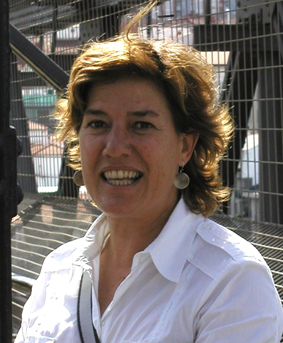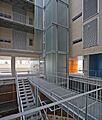Carmen Espegel facts for kids
Carmen Espegel Alonso (born in Palencia, Spain, in 1960) is a talented architect, teacher, and researcher. She earned her doctorate in Architecture from the Escuela Técnica Superior de Arquitectura de Madrid (ETSAM). There, she teaches classes about architectural design. Since 1985, she has worked at her own architecture studio. In 2003, she started a new company called espegel-fisac arquitectos. One of her most important books, "Heroines of Space. Women Architects in the Modern Movement," explores the important role women have played in architecture throughout history.
Contents
About Carmen Espegel
Carmen Espegel was born in Palencia, Spain. When she was 16, she moved to Madrid to study architecture. She graduated with honors from the Escuela Técnica Superior de Arquitectura de Madrid in 1985.
In 1989, she lived in Belgium for three years. During this time, she studied how to preserve historic towns and buildings at KU Leuven University. She finished this master's degree in 1995 with high honors. She also worked in France during this period.
After returning to Spain, she started her doctorate in Architecture at ETSAM. Her doctoral paper, which focused on a famous modern villa, won an award in 1997.
Carmen Espegel has written many books and articles about architecture. She often serves as a judge for architecture competitions both in Spain and other countries.
She began her independent architecture career in 1985. In 2003, she co-founded espegel-fisac arquitectos with architect Concha Fisac de Ron. Her firm has won many awards in design competitions. Her work has been shown in exhibitions around the world, including in Shanghai, London, and Berlin. Her projects have also been featured in many architecture magazines and books.
Carmen Espegel's career is special because she combines three important roles: she is a teacher, a researcher, and a practicing architect.
Teaching Architecture
Carmen Espegel is a Professor of Architectural Projects at the Escuela Técnica Superior de Arquitectura in Madrid. She has also been a guest teacher at universities in Portugal, Italy, and other places.
She taught about modern social housing in Europe. She also helped organize and teach a master's program about collective housing at the Universidad Politécnica de Madrid.
She has given lectures in many countries, including the United States, Brazil, Mexico, and several European nations. Her talks have covered topics like:
- "Lilly Reich: the spirit of the material" at the Fundación Juan March in Madrid.
- "Invitation to an Intellectual Journey. House E.1027 by Eileen Gray and Jean Badivici" at the International Archive of Women in Architecture in 2018.
- "Social Housing in Spain" at the American Institute of Architects in New York.
- "The Dream of Living" at Universidad Iberoamericana in Mexico.
From 2005 to 2008, she was an assistant director at the Escuela Técnica Superior de Arquitectura. She has been a certified university professor since 2013.
Research in Architecture
For the past twenty years, Carmen Espegel has focused her research on three main areas:
- Collective housing (buildings with many homes).
- Architectural criticism (analyzing and evaluating buildings).
- Women in architecture.
She leads a research group called GIVCO, which studies collective housing. She also teaches doctorate courses and guides students working on their own research papers.
Some of her research projects include:
- Mapping Public Housing: a critical review of the State-subsidized residential architecture in Portugal (1910–1974). Portugal 2015.
- American Heroines of the space: from domestic engineers to modern home. Columbia University of New York. USA 2012.
- Atlas of Spanish Collective Housing of the 20th Century. Spain 2012.
Important Projects
Carmen Espegel has worked on many different types of buildings and urban spaces. Here are some of her notable projects:
- 2015 – Town Hall and Cultural Center in Gumpoldskirchen, Austria.
- 2015 – Redesign of Tiburtino III Area in Rome, Italy.
- 2011 – Renovation of the Barquillo 13 building for the National Commission of Energy Headquarters in Madrid, Spain.
- 2011 – Casa Las Hormigas (House of the Ants) in Collado Villalba, Spain.
- 2010 – Civil Guard Barracks House in Oropesa del Mar, Spain.
- 2009 – Plaza de Mostenses: a market, offices, sports space, and food court in Madrid, Spain.
- 2008 – 114 price-controlled homes in Fuenlabrada, Spain.
- 2007 – Remodel of Mercado de Chamartín (Chamartín Market) in Madrid, Spain.
- 2004 – Remodel and adaptation of El Salón de Isabel II Park in Palencia, Spain.
- 2002 – 23 subsidized homes at Embajadores, 52 in Madrid, Spain.
- 2002 – Casa de Chapa (Sheet Metal House) in Guadarrama, Spain.
Awards and Recognitions
Carmen Espegel has received many awards for her architectural work and research:
- 2015 – First Place in an international competition for the City Hall and Cultural Center in Gumpoldskirchen, Austria.
- 2013 – COAM Award for her work on "Cuadernos de Vivienda, Poblado Dirigido de Orcasitas" in Madrid.
- 2011 – COAM Award for Casa Las Hormigas in Madrid.
- 2010 – First Place in an international competition for the Barrio Tiburtino III in Rome, Italy.
- 2008 – Veteco-Asefave Award for Best Window for her 114 dwellings project in Fuenlabrada.
- 2006 – Quality Award in Architecture and Housing from the Community of Madrid for Casa de Chapa.
- 2005 – Milka Bliznakov Prize for her book "Heroines of the Space."
- 2005 – COAM Award for the Embajadores 52 Dwellings.
- 2004 – First Prize in ATEG Galvanization for the Auditorium at the Salón de Isabel II Park.
- 2003 – COAM Award for Casa de Chapa.
- 2002 – Award for Best Built Project in the Past Five Years for Viviendas Embajadores 52.
- 2001 – First Prize for El Salón de Isabel II Park.
- 2000 – First Prize from the Madrid City Council for Embajadores 52 Dwellings.
- 1994 – COAM 93 Prize in Research for her paper "La villa urbana substantia de la ciudad mediterránea del siglo XXI."
Images for kids
See also
 In Spanish: Carmen Espegel para niños
In Spanish: Carmen Espegel para niños
 | Georgia Louise Harris Brown |
 | Julian Abele |
 | Norma Merrick Sklarek |
 | William Sidney Pittman |











